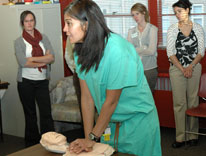
Several of Denver's poorest neighborhoods have two to three times the cardiac arrest rate as other neighborhoods, plus abysmal rates of bystander-delivered CPR.
Comilla Sasson, MD, with the Department of Emergency Medicine, University of Colorado School of Medicine, is leading a grassroots project to try to improve cardiac arrest survival rates in high-risk neighborhoods.
It's called HANDDS -- Identifying High Arrest Neighborhoods to Decrease Disparities in Survival. She received a community engagement grant from the Colorado Clinical & Translational Sciences Institute to study which Denver neighborhoods had higher than average out-of-hospital cardiac arrest rates but also lower than average bystander CPR rates.
"Four out of the five neighborhoods had zero victims who received CPR -- not a single person got CPR -- in over two years' worth of data," Sasson said. "So there's something going on."
The project identified the Baker, Westwood, Whittier, Villa Park and Valverde neighborhoods as high risk for death from cardiac arrest. The study -- a partnership between HANDDS, CU medical school Department of Emergency Medicine and Denver Health -- then conducted six focus groups in the neighborhoods and interviewed 64 residents about barriers and incentives for CPR awareness and training.
Residents' reasons for not responding to cardiac emergencies had to do with cultural and language barriers to seeking help, but also fear of doing CPR incorrectly and possibly being exposed to a lawsuit.
The various barriers and an overview of the collected data were presented in a community meeting at Mi Casa Resource Center on Monday evening.
Mandy Medrano, a HANDDS community liaison from Westwood, said the data shows that residents in her neighborhood generally don't want to call an ambulance or step in and do CPR. Medrano said it's imperative to get the word out that doing hands-only CPR is just as effective as traditional CPR and that calling 911 won't have adverse ramifications, Medrano said.
"Bringing that education, filling that gap, is the key to saving a life," she said.
Sasson told the group, which represented stakeholders across the communities, that "your hands really do save a life." She said there is one cardiac arrest in the city and county of Denver every day and that only one in 10 people who suffer cardiac arrest survives.
"We try to get people out of that mindset of, 'Oh, I did my baby-sitter training when I was 17, but haven't taken a CPR class since, so I can't do anything now if somebody falls down in front of me,'" Sasson said. "People think if they don't have a (CPR) card, they'll get in trouble. They worry if they do it wrong the can get sued. This is our way of trying to get the word out in the community that you can't really hurt them, especially if you're trying to help somebody."
The grassroots project will work with residents in the neighborhoods to design and implement a community-based intervention that will overcome these barriers. By targeting CPR training and cardiac arrest awareness in high-risk neighborhoods, it's believed that thousands of lives can be saved every year.
"This is the most important life skill you can have," Sasson said, after demonstrating how to perform CPR on simulator victim. "AEDs (automated external defibrillators) are really nice and helpful, but the big thing is knowing how to do CPR."
Sasson and Ariann Nassel, her project assistant in Emergency Medicine, are also involved in developing a state AED registry that will map the locations of AEDs around Colorado. The hope is for the registry to grow into a national database.
As part of the registry project, an AED Scavenger Hunt will take place from June 2-9 to challenge individuals or teams to find the most AEDs in the Denver metro area and win prizes, including air fare and grocery credits worth hundreds of dollars. For more information and how to register go to the "AED Scavenger Hunt" Facebook page.
For more information about HANDDS go to its website.
(Photo: Comilla Sasson, MD, demonstrates the proper hands-only CPR technique at a community meeting.)
